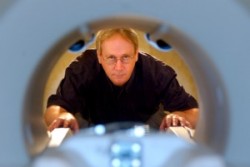
John C. Gore, Hertha Ramsey Cress University Professor of Radiology and Radiological Sciences at Vanderbilt University and professor of biomedical engineering, has been elected as a member of the National Academy of Engineering for his contributions to the development and applications of magnetic resonance and other imaging techniques in medicine.
Gore is the director of the Center for Imaging Science at Vanderbilt and leads the institute by connecting discoveries in the basic sciences and engineering to applications in biology and medicine. Gore holds additional professorships in physics and molecular physiology and biophysics.
“In addition to his work as an outstanding scientist, John Gore at the same time has established a world-class center that is advancing the state-of-the-art in imaging science, providing engineers and scientists working at Vanderbilt with the tools they need to conduct breakthrough studies in a wide variety of areas, ranging from neuroscience to biomedical engineering. It is very satisfying to see his contributions recognized at the national level like this,” said Chancellor Nicholas S. Zeppos.
The National Academy of Engineering announced the names of 68 new members and nine foreign associates Feb. 8. This brings the total U.S. membership to 2,290 and the number of foreign associates to 202.
Election to the National Academy of Engineering is among the highest professional distinctions accorded to an engineer. Academy membership honors those who have made outstanding contributions to engineering research, practice or education, including significant contributions to the pioneering of new and developing fields of technology, making major advancements in traditional fields of engineering, or developing innovative approaches to engineering education.
Kenneth F. Galloway, dean of the School of Engineering, applauded Gore’s work. [rquote]“John is an internationally renowned expert in imaging technology and a pioneer in magnetic resonance imaging and spectroscopy techniques. He is at the forefront of several novel engineering solutions being developed to address the technical challenges of human imaging using ultra-high field MRI and MRS. [/rquote]On behalf of the school, I congratulate him on this well-earned distinction.”
Gore’s research program is focused on the development of a variety of different imaging applications in neuroscience, cancer research and studies of metabolism. A general theme of his interest is to understand the physical and physiological factors that affect MRI signals and to use this knowledge to devise non-invasive imaging methods that provide new types of information. Many of his projects also involve the development and application of advanced image analysis methods and computer algorithms.
Gore is a fellow of the American Institute of Medical and Biological Engineers and the Institute of Physics (UK). Among his many honors and awards, Gore is a fellow of the International Society for Magnetic Resonance in Medicine and received the group’s gold medal award in 2004.
Gore, who joined the Vanderbilt faculty in 2002, received his Ph.D. in physics from the University of London and has held faculty appointments at the Royal Postgraduate Medical School in London and Yale University.